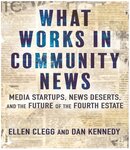


Study after study has connected breakdowns in civic participation, democracy, and discourse in America to the decline of local news. On Thursday, journalism professor and author Dan Kennedy will speak at the Manchester Public Library about his new book, “What Works in Community News: Media Startups, News Deserts, and the Future of the Fourth Estate,” co-written with former Boston Globe Editorial Page Editor Ellen Clegg. A nationally known media commentator, Kennedy was a panelist on WGBH’s Beat the Press and was a weekly columnist for the network. Dan is also a recipient of the Yankee Quill Award from the New England Academy of Journalists and the James W. Carey Journalism Award from the Media Ecology Association.
We sat down with Dan to talk about news, democracy, and bright spots in the future.
Dan, tell us about the book and how it came to be.
Well, I’ve spent pretty much my entire career tracking the media industry, first as a journalist and now as a professor at Northeastern University. I also host a weekly podcast exploring the future of news, called “What Works,” with Ellen Clegg, who served several significant roles at the Boston Globe, including managing the paper’s weekly local news sections.
My last two books, which were also about the future of news, were solo projects. But Ellen and I had already decided to work together, and we both knew there would be way too much travel for one person. It was the first time I’d ever worked with a collaborator, and it was wonderful. We shared the workload, and it was great also to have somebody to bounce ideas back and forth. We were able to profile news projects in Minnesota, California, Tennessee, New Haven, Iowa, Texas, and New Jersey as part of this.
A widely cited study cites some 2,900 newspapers have closed in the last 20 years. Your research shows that local news is essential to democracy and that without it, meaningful participation in civic life is impossible.
That’s right. Significant problems arise when you don't have a reliable source of local news and information. A big issue is that the rise of “news deserts” has most often affected marginalized communities—often highly rural communities or those of color—and they have been left without the day-to-day journalism they need to govern themselves in a democracy. In the book, we explain why that's important. And then, we give an in-depth overview of local and regional news projects in nine regions of the country that are profiled in our book.
It's funny, there have been various surveys taken over the years about whether people understand that local news is in crisis. And often, they say no. To them, the news seems pretty healthy. But what they usually referring to is local TV news. And they’re correct. Local TV news is relatively healthy. But Boston’s Channel 25 isn't coming to cover the Manchester Select Board every week. I like local TV news. I think they perform a service, but it's not really local. It’s regional.
What are some trends happening with bigger newspapers?
One notable trend has been the rise of newspaper ownership by the wealthy, especially in saving a few legacy newspapers, which I wrote about in my last book, The Return of the Moguls. John Henry at the Boston Globe, for instance. Jeff Bezos at the Washington Post is another. And then Aaron Kushner—who’s not quite a billionaire … just a rich guy—at the Orange County Register. Unfortunately, the Orange County Register today is part of the Alden Global Capital hedge fund, so it’s been pretty much decimated. We’ll see how this all goes.
Then there is the Minneapolis Star Tribune, which went into bankruptcy about 15 years ago and was eventually acquired by a billionaire, Glen Taylor. He is not running the Star Tribune as a charity. He's put a lot of investment into reinvigorating the paper and today, it's profitable and growing, winning Pulitzers. It’s a great example showing that large regional papers can be a commercial success.
Your book introduces some bright spots in community news, correct?
There are innovative journalism models we can see across the country to fill news deserts and empower communities. Many are evolving, like the New Haven Independent, a wonderful nonprofit local news project that we profile in the current book. I wrote my 2013 book, The Wired City, mainly about New Haven. Ellen and I are revisiting New Haven in What Works in Community News because the project has changed quite a bit. It now has expanded to include a community radio station that really brings in the voice of the communities of color in New Haven in a way that the Independent alone really wasn't doing.
Some examples in your book seem to be hybrids.
Yes. The Colorado Sun is one of the larger projects that we looked at. It’s a wonderful, wonderful digital-only news site started by 10 people who quit the Denver Post because they were tired of all of the cuts after the Post was purchased by a hedge fund, Alden Global Capital. They're now up to a couple of dozen staff people, which makes it one of the larger news organizations in Colorado. Interestingly, the Colorado Sun started out as a for-profit but while we were studying them, they made the decision to become a nonprofit. That latest change didn’t make it into the book, but I’ve written about it for Nieman Lab and continue to follow it.
Another interesting, much more local example of this in the Provincetown Independent on Cape Cod, which is committed to staying as a public benefit corporation with a nonprofit arm. They're an absolutely terrific paper. They’ve maintained that business model, although they're much smaller than the Colorado Sun.
I notices many of the organizations you profile are non-profits.
That’s because that structure is working. A great example is the NJ Spotlight News, which started about 10 or 12 years ago as a website covering state policy and politics. There were a number of those around the country. The best known is the Texas Tribune. But what’s interesting about NJ Spotlight News is that about three or four years ago, they ran into financial trouble and then merged with NJ PBS, the big public television operation. Today, they run a daily half-hour newscast on TV that often features reporting by the website. It features interviews with reporters on the website. And at the same time, the newscast is broken up into individual stories. And those all get posted on the website.
But back to community news, what are the areas of optimism and concern for you?
Well, I think that the biggest thing that Ellen and I are concerned about is the unserved markets. The fairly affluent, well-educated suburban areas will find ways to take care of themselves. I mean, my goodness, Marblehead has three competing startups at this point. But rural markets and communities of color aren’t being overlooked. The Storm Lake Times Pilot in Iowa, which we write about, is a good example. They’re a for-profit; they’re alive and well, but they struggle. They really struggle. It's a rural area without an awful lot of money to support them. That’s a concern.
I’ve learned that cities without a newspaper have lower bond ratings than comparable cities that do have a newspaper.
That’s right. People who are lending money know that there's absolutely no one keeping track of how their money's been spent. So, they demand a premium to account for that. We also know that in cities with no newspaper, fewer people run for political office, and voter turnout declines. We also really believe that it contributes to the terrible political polarization that we're going through these days because people are very engaged with national news or engaging in national news sources that feed their preexisting beliefs about national politics and feed off a steady diet of lies and propaganda.
What about the impact on local life?
You might see people descend on school committee meetings, and instead of saying, “How come our math scores aren't what they should be?” they're talking about book banning or transgender issues. That’s what happens in places where the only information diet they have is national sources interested in lies and polarization. It’s really unfortunate.
There was another study that was done a few years ago. It was a complicated study, where they compared a Ganett newspaper — let me see if I can explain this. The study looked at a daily newspaper owned by Gannett that replaced all nationally syndicated content from its OpEd page and replaced it with local and regional opinion for one month. In the study, scholars measured political polarization against another paper that kept the nationally syndicated political content. They found that political polarization measurably declined during that period among readers of the Gannett paper.
Are there solutions for the industry, like government funding?
Well, there have been proposals for a series of tax credits kicking around for years now. The idea is to provide a tax credit to people who either donate to a nonprofit news outlet or buy a subscription to a for-profit, another tax credit for local advertisers. There are also ideas of a tax credit for publishers if they hire or retain journalists. And there are some others. But I don't really hold out much hope for government assistance. I'm also skeptical of it.
Another idea that's been pushed by US Senator Amy Klobuchar is the Journalism Competition and Preservation Act, which would essentially force Google and Facebook to come to the bargaining table and fork over some advertising revenues for the news that they use and monetize. But, frankly, I’m skeptical if the money will go to the right place. In Australia, this type of program has mainly gone to further enrich Rupert Murdoch.
I’m also skeptical of direct government assistance. How can a news outlet cover government effectively when it’s financially supported by that government? In California, there was a $25 million fund created for five years earmarked to pay the salaries of recent graduates of the Berkeley School of Journalism to cover local news and underserved communities. That program seems like it’s fairly well insulated from political interference. Then again, at the end of five years when it goes for renewal, maybe a state legislator in one of those communities doesn’t like the coverage they were getting to you may see pushback. So, at least in theory, there's some independence problems there as well.
You’ve given us a lot to think about. Thank you, Dan.
Thank you.
Dan Kennedy will be speaking on Thursday, January 11 at 7 p.m. by Zoom through the Manchester Public Library. Register online here. “What Works in Community News: Media Startups, News Deserts, and the Future of the Fourth Estate,” by Ellen Clegg and Dan Kennedy, is available now for purchase online, or it can be ordered at your local independent book shop.